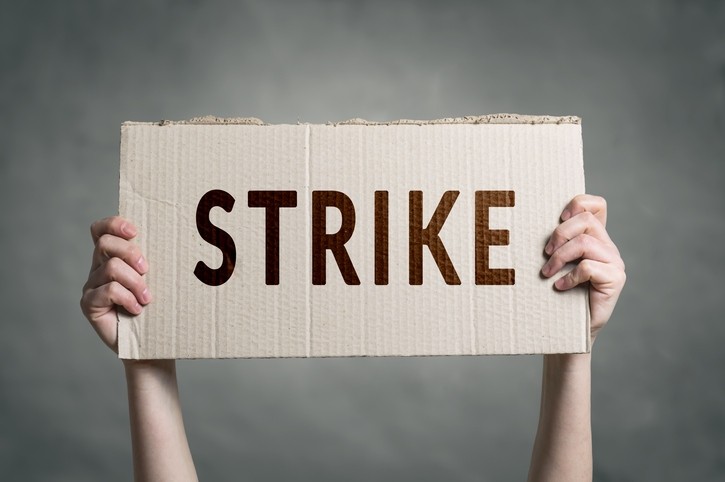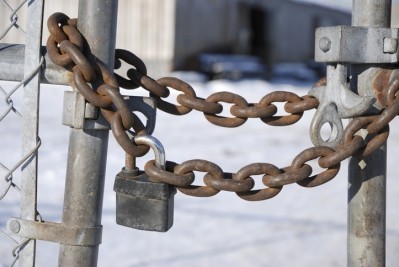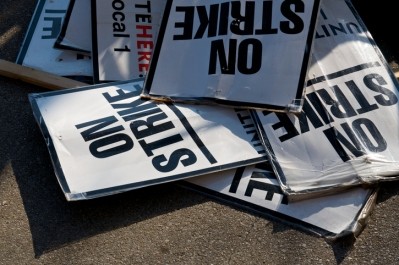Strike: Thousands of Kroger employees in Colorado walk after dismissing ‘last, best and final’ offer

The United Food and Commercial Workers Local 7 union representing 8,400 employees at dozens of Kroger’s King Soopers stores in Denver voted by 95% to strike at 5 a.m. Jan. 12 after a breakdown in negotiations about wages, health benefits and working conditions.
According to Kroger, union representatives left the bargaining table late last week and “never returned,” forcing it to issue by email what it called its best and last offer, which included a higher starting wage of $16 per hour, wage increases up to $4.50 per hour for employees’ based on their jobs and tenure, tiered bonuses for active associates and guaranteed healthcare premiums for the next three years at the current levels alongside other health benefits.
According to the union, the proposals, which it characterized as “unacceptable and insulting” concessions, fell woefully short and did not address other staff concerns, such as “allowing for a new subclass of gig workers to steal hours and drain the health fund for long-term King Soopers associates,” restricting access to overtime, and failing to ensure stores are safe, “among many more” complaints.
The union also criticized the offer as failing to recognize and compensate for the unique risks and challenges employees face during the ongoing pandemic.
“We strike because it has become clear this is the only way to get what is fair, just and equitable for the grocery workers who have risked their lives every day just by showing up to work during the pandemic,” Kim Cordova, the union’s president and vice president of UFCW International, said in a statement.
Many of the complaints echo those made by other essential workers in the food industry, including those made by local officers of the Bakery, Confectionery, Tobacco Workers and Grain Millers International union against Kellogg and Mondelez.
Even though deals eventually were struck between the unions and both manufacturers, their drawn-out and very public negotiations could influence Kroger’s current confrontation. For example, like Kroger, Kellogg threatened union members that a proposal offered and rejected out-of-hand by union leaders in November was its “last best final offer” – an ultimatum that ultimately rang false.
While there certainly is room for Kroger, like Kellogg, to come back with another offer after declaring this one its last and best, it also has a track record for playing hard ball and making decisions that some might consider extreme. For example, last year, Kroger shuttered several underperforming stores rather than comply with local ordinances mandating temporary hazard pay increases for some grocery employees during the pandemic – a move that was copied by a handful of other stores.
From posturing to personal
While negotiating contracts between unions and employers often is accompanied by some degree of posturing on each side as stakeholders try to cast themselves and their positions in the best light, the discussion between Kroger and UFCW’s Local 7 has taken a personal turn with Kroger questioning the union president’s intentions.
Expressing its disappointment in the decision to strike, Kroger questioned in a statement whether Cordova was negotiating with employees’ best interests as her primary focus.
“We believe your union president has been determined from the onset of negotiations to take you out on strike to serve her own self-interests,” as demonstrated by what Kroger positions as the union’s “more favorable treatment” of its largest and unionized competitor Safeway/Albertsons and Cordova’s former employer, which also is in contract negotiations with Local 7.
Kroger argues that Cordova showed “favoritism to Safeway by extending their contact at the same time she’s threatening” to take Kroger employees on strike. Likewise, suggests that she is blocking the inclusion of long-standing anticompetitive language in the contracts.
Kroger wants both contracts to provide the same wage increases, as it says they have done for nearly 20 years, as a way to level the competitive playing field between the retailers.
“We believe that without the protection of that language, your union president could provide a sweetheart deal to Safeway/Albertsons and in essence sabotage our ability to compete and provide good stable jobs,” Kroger said in a statement.
The union countered in a same day statement that Kroger is arguing for a “most-favored-nation clause concerning wages – meaning that if Kroger’s competitors have lower wage rates, King Sooper/City Market does not have to honor the wage increases that it is proposing to workers.”
Unwilling to give into those and other demands, Cordova said the Local 7 union “will continue to be relentless in fighting for our members.”
As both sides appear to dig their heels in it is unclear how long the strike could last, but Kroger appeared to offer a little wiggle room by reaffirming in the same statement in which it outlined its “last, best and final offer,” that it simultaneously “remains focused on the bargaining process and doing what is best for its associates, customers and the community.”









